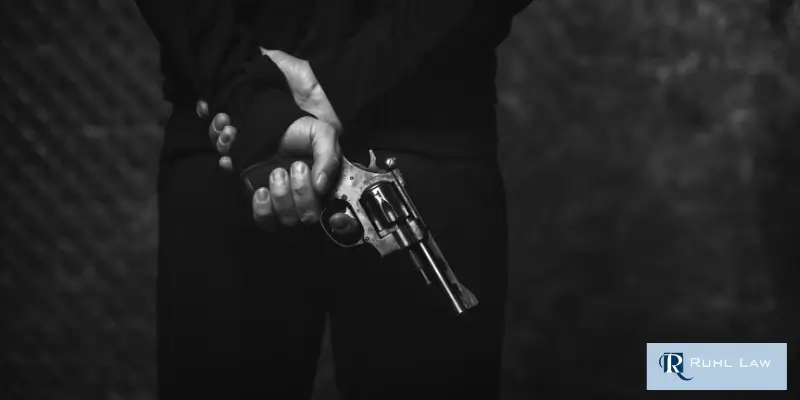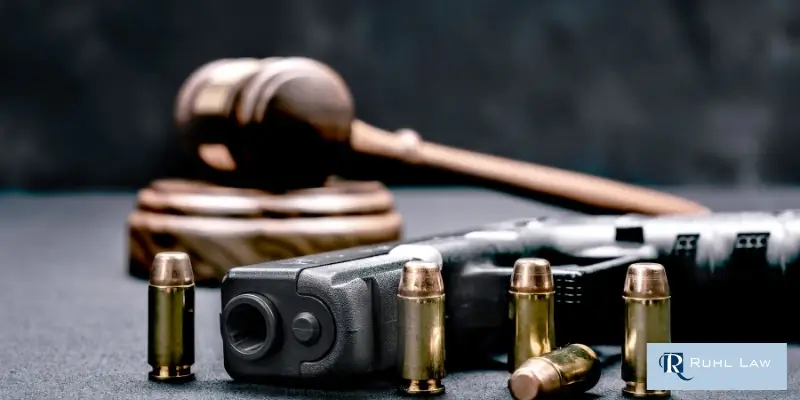Can a Convicted Felon Own a Gun in Florida? All You Need To Know

Can a Convicted Felon Own a Gun in Florida? All You Need To Know
If you’ve been convicted of a felony in Florida, you may be wondering if owning a gun is still in the cards for you. Whether you’re looking to protect your home or are simply curious about learning more about your rights, understanding the laws surrounding firearm possession after a felony conviction can be confusing. Here we answer the question, “Can a convicted felon own a gun in Florida?”
In this guide, we break down the key information you need to know about whether a felon can own a gun in Florida, the process of restoring gun rights, and the rules that apply. The criminal defense attorneys at Ruhl Law, P.A. can assist you in whatever legal gun matter you are dealing with. In 2022, Florida reported 3,232 firearm-related deaths, and the state’s law enforcement agencies take these matters seriously.
All You Need to Know: Can a Convicted Felon Own a Gun in Florida
Florida holds specific laws that limit gun ownership for convicted felons, but there are pathways to restore those rights in certain situations. According to Florida Statute 790.23, anyone who is convicted of a felony cannot legally possess a firearm. This includes handguns, rifles, shotguns, and even specific types of ammunition. This prohibition applies indefinitely, unless you take the steps to have your rights restored.

Restoring Gun Rights in Florida
While a felony conviction typically prohibits you from owning a gun in Florida, there are ways to regain those rights. In Florida, you can petition for the restoration of your civil rights, including the right to own a firearm, through the Florida Clemency Board. The Clemency Board consists of the state’s governor and cabinet members who review and decide whether or not to restore your rights.
- Eligibility for restoration. The clemency process is available for most felons, but it is generally not open to individuals who were convicted of serious crimes like murder or sexual offenses. Certain violent felonies may make it more difficult to regain gun rights.
- How to apply. To start the restoration process, you generally first have to complete your sentence, including parole and probation, pay any fines or restitution, and wait a specific period before applying. The Clemency Board may require that you submit a written application and appear before them in a hearing.
- Approval. If your rights are restored, you’ll be allowed to legally own a firearm again. However, restoration is not guaranteed, and some applicants are denied.
- Pardon. If you receive a full pardon from the governor of Florida or the President of the United States, your firearm rights could be restored without the need for clemency.
- Federal gun rights. While Florida may restore your state rights, federal law still applies. If your felony conviction falls under a federal prohibition, like some domestic violence convictions, federal law may still prevent you from owning a firearm. The broader legal landscape around criminal charges in Florida plays a major role in determining how firearm rights are regulated and enforced.
If you are caught in possession of a firearm as a convicted felon in Florida, you may be charged with a felony, which carries penalties such as prison time, probation, and fines. The penalties can be harsh, so it is vital that you are fully aware of the legal restrictions surrounding gun ownership.
Florida Clemency Board
Florida’s gun clemency board hearings, conducted by the Florida Commission on Offender Review as part of the Office of Executive Clemency process, are typically held at the State Capitol in Tallahassee, Florida.
Specifically, these hearings occur in the Cabinet Meeting Room, located on the lower level (LL-03) of the Capitol building at 400 South Monroe Street, Tallahassee, FL 32399, where the Clemency Board, consisting of the Governor and members of the Florida Cabinet, convenes quarterly to review applications, including those for restoration of firearm rights.

FAQs About Florida Gun Rights Restoration Law
Can a Felon Get His Gun Rights Back in Florida?
In Florida, a felon can potentially regain their gun rights, but the process is challenging and involves several legal steps. The first step is to restore their civil rights, like voting and the ability to serve on a jury. Sometimes these rights are automatically restored after completing a sentence, but it depends on the nature of your offense.
What Kind of Gun Can a Felon Own in Florida?
In Florida, a felon is generally prohibited from owning or possessing all firearms and ammunition, but there may be an exception where a felon can file a petition to have their gun rights restored. Even if a felon’s civil rights are restored, they may still face restrictions that they should be aware of.
Can My Wife Own a Gun If I’m a Felon in Florida?
Yes, your wife can own a gun in Florida, even if you are a felon. Your wife cannot be a convicted felon herself and must meet all legal requirements for gun ownership. The firearm should be securely stored and not accessible to you in order to avoid any legal complications.
Is Florida a Felon-Friendly State?
Florida is not typically considered a “felony-friendly” state, as it holds strict laws and regulations regarding felons’ rights and penalties. There are opportunities for felons to regain their rights over time, through processes like restoration of civil rights. Felons face serious challenges in the state, including restrictions on voting, firearm ownership, employment, and housing.
What Is Legal Gun Ownership?
Legal gun ownership refers to the act of possessing, purchasing, and using firearms in accordance with both state and federal laws. The specific rules governing legal gun ownership can vary from state to state, but generally follow similar guidelines that ensure safety, responsibility, and lawful conduct. It is vital that if you are a gun owner, you stay informed on the changing laws and regulations on ownership to remain in full compliance with the law.
Speak With a Trusted Criminal Defense Lawyer Today
Navigating the laws around gun ownership as a convicted felon in Florida can be complicated, but understanding your rights and the steps needed to restore them can help you make informed decisions. While a felony conviction typically bars you from owning a firearm, there are paths to regaining your rights, such as petitioning for restoration through the Florida Clemency Board.
If you are uncertain about your situation or need guidance, reach out to Ruhl Law, P.A. to set up an initial consultation with a trusted criminal defense lawyer and learn about your options.
© 2026 Ruhl Law, P.A. • All Rights Reserved.


